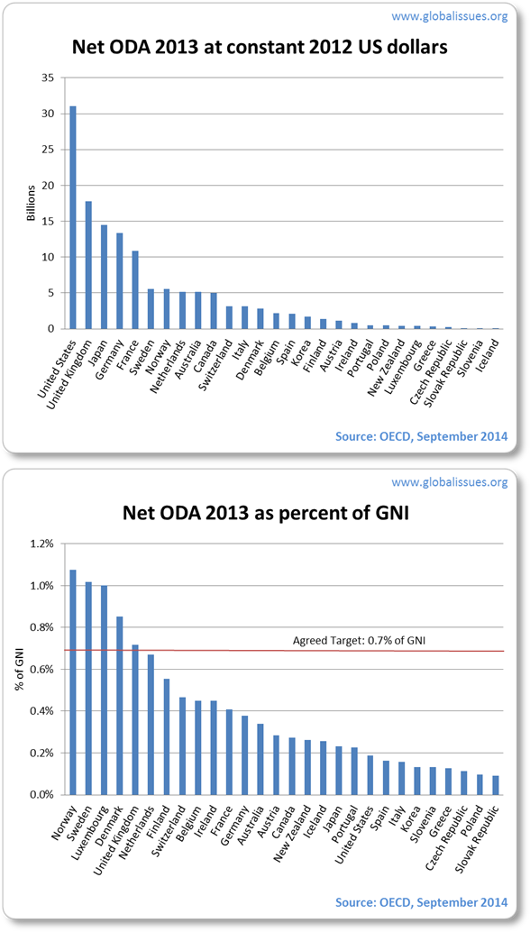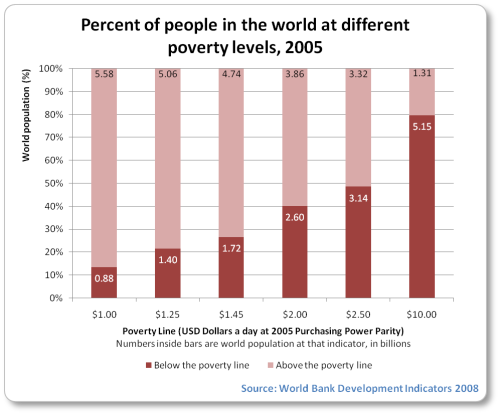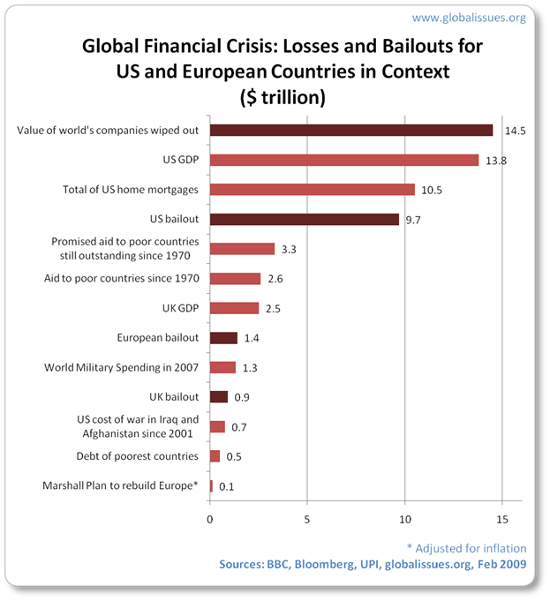Today, around 21,000 children died around the world. This daily tragedy, from poverty and other preventable causes, rarely makes headline news.
Latest world news
World
Explainer: What You Need to Know About Climate Change and Blue Carbon
- Inter Press Service

NEW DELHI, Jun 08 (IPS) - The area where land meets the sea, known as coastal ecosystems, could be the key to reducing the effects of climate change.
Convention on the Rights of Persons with Disabilities: 5 fast facts
- UN News

Imagine daily life without your sight, hearing or a limb or living with the challenges of neurodiversity or paralysis. That’s a reality for some. One in six of us – or 16 per cent – of the global population had a disability in 2023, according to the World Health Organization (WHO), and many depend on the Convention on the Rights of Persons with Disabilities to help guard their fundamental freedoms and dignity.
India’s Election: Cracks Start to Show in Authoritarian Rule
- Inter Press Service

LONDON, Jun 07 (IPS) - India’s Hindu nationalist strongman Narendra Modi has won his third prime ministerial term. But the result of the country’s April-to-June election fell short of the sweeping triumph that seemed within his grasp.
A Nuclear-Armed European Union? A Proposal Under Fire
- Inter Press Service

UNITED NATIONS, Jun 07 (IPS) - The continued veiled threats from Russia, warning of nuclear attacks on Ukraine, have prompted some politicians in Europe to visualize a nuclear-armed European Union (EU).
Are We Equipping Women or Merely Filling the Gender Gap?
- Inter Press Service

PRETORIA, South Africa, Jun 07 (IPS) - In the expansive field of groundwater resource management, a pressing question often emerges: are we truly equipping women with the necessary tools and opportunities to thrive, or are we simply attempting to fill in the gender gap without tackling the root causes?
Blue Economy Must Benefit Fishing Communities in Global South, Says WorldFish Chief
- Inter Press Service

SYDNEY, Jun 07 (IPS) - The Global South is crucial for ensuring aquatic food security to feed the growing world population. It is imperative that blue economy initiatives benefit fishing communities in developing and small island nations, which are facing disproportionate impacts of climate change, says Dr Essam Yassin Mohammed, Director General of WorldFish, an international non-profit research organization based in Penang, Malaysia.
Youth Speak Out Against Big Tobacco
- Inter Press Service

BANGKOK, Jun 07 (IPS) - Each year, millions of children worldwide fall prey to the targeted tactics of the tobacco industry in its attempts to lure new customers. This year’s World No Tobacco Day (May 31), aptly themed “Protecting children from tobacco industry interference”, saw global youth unite to confront the pervasive influence of Big Tobacco.
World News in Brief: UN staff detained in Yemen, cyclone threat for Haiti, rights chief Lao PDR, climate change
- UN News

UN Spokesperson Stéphane Dujarric confirmed on Friday that Houthi de facto authorities in Yemen have detained 11 UN national staff working for the Organization there.
World Oceans Day event highlights immediate action to protect oceans
- UN News

UN World Oceans Day, celebrated on Friday at UN Headquarters in New York, focused on “opening minds, igniting senses, and inspiring possibilities” to protect marine life worldwide.
Terrorism, humanitarian crises threaten stability of West Africa: UN deputy chief
- UN News

Rapidly evolving global political, social, environmental and security challenges risk undermining peace and economic development across West Africa, the UN deputy chief said on Friday, reiterating the importance of a multilateral and inclusive response.
- More stories…
Climate
Explainer: What You Need to Know About Climate Change and Blue Carbon
- Inter Press Service

NEW DELHI, Jun 08 (IPS) - The area where land meets the sea, known as coastal ecosystems, could be the key to reducing the effects of climate change.
Are We Equipping Women or Merely Filling the Gender Gap?
- Inter Press Service

PRETORIA, South Africa, Jun 07 (IPS) - In the expansive field of groundwater resource management, a pressing question often emerges: are we truly equipping women with the necessary tools and opportunities to thrive, or are we simply attempting to fill in the gender gap without tackling the root causes?
Blue Economy Must Benefit Fishing Communities in Global South, Says WorldFish Chief
- Inter Press Service

SYDNEY, Jun 07 (IPS) - The Global South is crucial for ensuring aquatic food security to feed the growing world population. It is imperative that blue economy initiatives benefit fishing communities in developing and small island nations, which are facing disproportionate impacts of climate change, says Dr Essam Yassin Mohammed, Director General of WorldFish, an international non-profit research organization based in Penang, Malaysia.
World Oceans Day event highlights immediate action to protect oceans
- UN News

UN World Oceans Day, celebrated on Friday at UN Headquarters in New York, focused on “opening minds, igniting senses, and inspiring possibilities” to protect marine life worldwide.
Quiet Revolution Underway as IFADs Innovative Solutions Rise to Global Rural Challenges
- Inter Press Service

NAIROBI & ROME, Jun 06 (IPS) - Technology and innovation are at the center of the International Fund for Agricultural Development’s strategy to fulfill its global mission to eradicate poverty and hunger in the developing world, IFAD’s President Alvaro Lario told IPS in an exclusive interview.
World Environment Day: UN Secretary-General Reckons with ‘A Moment of Truth’ on Climate Action
- Inter Press Service

NEW YORK, Jun 05 (IPS) - Coming at a time of record-breaking global temperatures over the last twelve months, the UN chief calls on world leaders, including the G20 and G7 members, to commit to their climate action goals as laid out in the Paris Agreement. Experts across multiple industries are also encouraged to do their part to mitigate the impact of the climate crisis.
Stories from the UN Archive: BBC legend and UN Earth Champion
- UN News

As communities across the planet celebrated World Environment Day on 5 June, we are taking you back to the 1950s when broadcaster extraordinaire Sir David Attenborough went from zoologist to climate activist, winning the UN’s highest environmental award.
There is an exit off ‘the highway to climate hell’, Guterres insists
- UN News

“It’s climate crunch time” when it comes to tackling rising carbon emissions the UN Secretary-General said on Wednesday, stressing that while the need for global action is unprecedented, so too are the opportunities for prosperity and sustainable development.
World heading towards new temperature records, UN weather watchdog warns
- UN News

At least one of the years between now and 2028 will very likely set a new temperature record breaking through the crucial 1.5°C temperature limit, the UN weather agency, WMO, said on Wednesday.
UPDATING LIVE: Guterres issues hard-hitting call for climate action
- UN News

Welcome to our live coverage of one of the most important speeches on climate change that António Guterres has made since becoming Secretary-General. We're reporting live from the event in Manhattan, providing all the background information you need on the speech itself - and reaction to it inside the hall and around the world.
- More stories…
Health
At World Health Assembly, countries agree on efforts to boost pandemic preparedness
- UN News

Countries on Saturday agreed to a set of key actions to better guide and coordinate international efforts in preventing, detecting, and responding to public health risks, while also committing to finalize negotiations on a global pandemic agreement within a year at the latest.
People at Risk Need Protection Before Another Hot Summer
- Inter Press Service

BRUSSELS, May 29 (IPS) - Spring has traditionally brought a welcome new beginning: daylight increases, flowers bloom and temperatures are pleasantly warm. However, in recent years, it’s also brought justified fears about extreme heat with summers in Southern Europe getting increasingly hot because of climate change. Older people, children, people with disabilities, and people with mental health conditions are among those at higher risk.
Gaza: Rafah camp attack heightens focus on dwindling health resources
- UN News

UN agencies on Tuesday reiterated their call for an urgent ceasefire and humanitarian access in Gaza following Israeli air strikes on Sunday that hit a camp for displaced Palestinians in Rafah, killing 45 people, according to the Hamas-run Ministry of Health.
COVID-19 eliminated a decade of progress in global level of life expectancy
- UN News

Data crunched by the UN World Health Organization (WHO) has revealed that the COVID-19 emergency reversed more than a decade of gains in life expectancyreinforcing the need for countries to agree on a global pandemic treaty to protect future generations.
WHO report reveals major health disparities between European teens
- UN News

A report published on Thursday from the World Health Organization’s (WHO) European region has revealed alarming health disparities in young people, especially those from less affluent families, representing a “vicious cycle of disadvantage”.
International Community Urged to End Impunity for Violence Against Healthcare in Conflicts
- Inter Press Service

BRATISLAVA, May 22 (IPS) - Governments and international agencies must do more to end impunity for violence against healthcare, campaigners have urged, as a new report shows that attacks on healthcare during conflicts reached a new high last year.
Stories from the UN Archive: Magic suitcases for 1960s midwives
- UN News

Can a magic suitcase save lives?
‘Critical gaps’ in understanding climate change fuel tropical disease spread
- UN News

A comprehensive review by the UN health agency has revealed critical gaps in understanding the full impact of climate change on malaria, dengue, trachoma and other tropical diseases.
WHO reports major increase in sexually transmitted infections
- UN News

Sexually transmitted infections (STIs) such as syphilis are on the rise in most regions of the world, UN health agency WHO said in a new report on Tuesday.
Syria: WHO Regional Director calls for greater investment in health sector
- UN News

Failure to invest in the health of the Syrian people will only deepen instability in the war-ravaged country and pose threats to regional and global security, a senior official with the World Health Organization (WHO) has said.
- More stories…
Economy
Explainer: What You Need to Know About Climate Change and Blue Carbon
- Inter Press Service

NEW DELHI, Jun 08 (IPS) - The area where land meets the sea, known as coastal ecosystems, could be the key to reducing the effects of climate change.
Terrorism, humanitarian crises threaten stability of West Africa: UN deputy chief
- UN News

Rapidly evolving global political, social, environmental and security challenges risk undermining peace and economic development across West Africa, the UN deputy chief said on Friday, reiterating the importance of a multilateral and inclusive response.
Europe Can Reap Sizable Energy Security Rewards by Scaling Up Climate Action
- Inter Press Service

WASHINGTON DC, Jun 05 (IPS) - Russia’s invasion of Ukraine triggered Europe’s worst energy crisis since the 1970s and put energy security back at the top of the policy agenda.
Policymakers reacted swiftly by securing alternative natural gas supplies, improving energy efficiency, and expanding renewables.
The Dilemma for Small Island Developing States: Recovery or Development?
- Inter Press Service

KATHMANDU, Nepal, Jun 03 (IPS) - “We are facing unenviable decisions, between the recovery of today or the development of tomorrow”. These were the words of Fiam? Naomi Mata?afa, of Samoa at the opening of the 4th International Conference on Small Islands Developing States (SIDS4).
SIDS go forward with ‘new sense of hope, solidarity and determination’
- UN News

The roadmap towards achieving resilient prosperity for small island States adopted on Thursday in Antigua and Barbuda “marks the beginning of a new journey” and a decade of delivery for their citizens and the world, said the UN Deputy Secretary-General on Thursday.
To Tackle Climate Crisis, the World Bank Must Stop Financing Industrial Livestock
- Inter Press Service

WASHINGTON DC, May 29 (IPS) - Last week, the World Bank Group released a new report that highlights the urgent need to drastically reduce GHG emissions to address the climate crisis and calls on countries to act. However, while the World Bank’s acknowledgment of the damaging climate impacts of industrial agriculture is a crucial step forward, it’s simply not enough.
More climate funding needed to ‘transition from rhetoric to decisive action’
- UN News

Climate action taken so far to help fund efforts in cash-strapped small island developing States (SIDS) “does not measure up to what has been said” in the wake of COP28 in Dubai last year.
Global unemployment set to decline slightly this year: UN labour agency
- UN News

Global unemployment numbers will fall modestly this year, but unequal access to jobs is still a problem worldwide, particularly for women in poorer countries, the International Labour Organization (ILO) said in a new report published on Wednesday.
Small Island Developing States drowning in debt and ‘running on empty’, warns Guterres in Antigua
- UN News

International financing is the fuel for sustainable development, but small island States are “running on empty” - drowning in debt and rising sea levels due to climate change and through no fault of their own.
UN hub reaches remote Pacific islanders: A UN Resident Coordinator blog
- UN News

The communities of thousands of tiny Pacific islands are the frontline gamechangers tackling the climate crisis, and a hub based in Micronesia now hosts more than a dozen UN agencies that together are helping address some of their most pressing needs as they battle existential threats like rising sea levels.
- More stories…
More news topics
Read more news stories by
More news by World, Economy, Environment, Geopolitics, Health, Human Rights, More news topics …
World news powered by and
and 
Issues in depth
Latest
Action on climate change is cheaper than inaction
Many are afraid that tackling climate change is going to be too costly. But increasingly, studies are showing action will not just be cheaper than inaction, but could actually result in economic, environmental and even health benefits, while improving sustainability.
Read “Action on climate change is cheaper than inaction” to learn more.
Climate Change and Global Warming Introduction
 The climate is changing. The earth is warming up, and there is now overwhelming scientific consensus that it is happening, and human-induced. With global warming on the increase and species and their habitats on the decrease, chances for ecosystems to adapt naturally are diminishing.
The climate is changing. The earth is warming up, and there is now overwhelming scientific consensus that it is happening, and human-induced. With global warming on the increase and species and their habitats on the decrease, chances for ecosystems to adapt naturally are diminishing.
Many are agreed that climate change may be one of the greatest threats facing the planet. Recent years show increasing temperatures in various regions, and/or increasing extremities in weather patterns.
This section looks at what causes climate change, what the impacts are and where scientific consensus currently is.
Read “Climate Change and Global Warming Introduction” to learn more.
COP20—Lima Climate Conference
 An overview of the Climate Change Conference (also known as COP 20), held in Lima, Peru in December 2014.
An overview of the Climate Change Conference (also known as COP 20), held in Lima, Peru in December 2014.
While it seemed like it was a successful meeting, because developing nations were committed to drawing up their own plans for emissions reductions for the first time, a number of important issues were left undecided such as how financing would work.
This page is an overview of the Lima Climate conference.
Read “COP20—Lima Climate Conference” to learn more.
Ebola Outbreak in West Africa
An overview of the Ebola virus outbreak in West Africa that has been described by the World Health Organization as the largest, most severe and most complex outbreak in the history of the disease.
The epidemic began at the end of 2013, in Guinea. From there it spread to Liberia, Sierra Leone, Nigeria and Senegal. Many of the affected countries face enormous challenges in stopping its spread and providing care for all patients.
Thousands of people have died and many are at risk as the fatality rate from this virus is very high. As the crisis worsens, as well as the enormous health challenges involved, the social and economic consequences may set these countries back, reversing some gains a number of these countries have made in recent years.
Read “Ebola Outbreak in West Africa” to learn more.
Foreign Aid for Development Assistance
In 1970, the world’s rich countries agreed to give 0.7% of their gross national income as official international development aid, annually.
Since that time, billions have certainly been given each year, but rarely have the rich nations actually met their promised target.
For example, the US is often the largest donor in dollar terms, but ranks amongst the lowest in terms of meeting the stated 0.7% target.
Furthermore, aid has often come with a price of its own for the developing nations. Common criticisms, for many years, of foreign aid, have included the following:
- Aid is often wasted on conditions that the recipient must use overpriced goods and services from donor countries
- Most aid does not actually go to the poorest who would need it the most
- Aid amounts are dwarfed by rich country protectionism that denies market access for poor country products while rich nations use aid as a lever to open poor country markets to their products
- Large projects or massive grand strategies often fail to help the vulnerable; money can often be embezzled away.
This article explores who has benefited most from this aid, the recipients or the donors.
Read “Foreign Aid for Development Assistance” to learn more.
Nature and Animal Conservation
 Preserving species and their habitats is important for ecosystems to self-sustain themselves.
Preserving species and their habitats is important for ecosystems to self-sustain themselves.
Yet, the pressures to destroy habitat for logging, illegal hunting, and other challenges are making conservation a struggle.
Read “Nature and Animal Conservation” to learn more.
Most Popular
Poverty Facts and Stats
Most of humanity lives on just a few dollars a day. Whether you live in the wealthiest nations in the world or the poorest, you will see high levels of inequality.
The poorest people will also have less access to health, education and other services. Problems of hunger, malnutrition and disease afflict the poorest in society. The poorest are also typically marginalized from society and have little representation or voice in public and political debates, making it even harder to escape poverty.
By contrast, the wealthier you are, the more likely you are to benefit from economic or political policies. The amount the world spends on military, financial bailouts and other areas that benefit the wealthy, compared to the amount spent to address the daily crisis of poverty and related problems are often staggering.
Some facts and figures on poverty presented in this page are eye-openers, to say the least.
Read “Poverty Facts and Stats” to learn more.
Global Financial Crisis
 Following a period of economic boom, a financial bubble — global in scope — burst, even causing some of the world’s largest financial institutions have collapsed. With the resulting recession, many governments of the wealthiest nations in the world have resorted to extensive bail-out and rescue packages for the remaining large banks and financial institutions while imposing harsh austerity measures on themselves.
Following a period of economic boom, a financial bubble — global in scope — burst, even causing some of the world’s largest financial institutions have collapsed. With the resulting recession, many governments of the wealthiest nations in the world have resorted to extensive bail-out and rescue packages for the remaining large banks and financial institutions while imposing harsh austerity measures on themselves.
Some of the bail-outs have also led to charges of hypocrisy due to the apparent socializing of the costs while privatizing the profits.
Furthermore, the institutions being rescued are typically the ones got the world into this trouble in the first place. For smaller businesses and poorer people, such options for bail out and rescue are rarely available when they find themselves in crisis.
Plummeting stock markets at one point wiped out 33% of the value of companies, $14.5 trillion. Taxpayers bailed out their banks and financial institutions with large amounts of money. US taxpayers alone have spent some $9.7 trillion in bailout packages and plans. The UK and other European countries have also spent some $2 trillion on rescues and bailout packages. More is expected. Much more.
Such numbers, made quickly available, are enough to wipe many individual’s mortgages, or clear out third world debt many times over. Even the high military spending figures are dwarfed by the bailout plans to date.
This problem could have been averted (in theory) as people had been pointing to these issues for decades. However, during boom, very few want to hear such pessimism. Does this crisis spell an end to the careless forms of banking and finance and will it herald a better economic age, or are we just doomed to keep forgetting history and repeat these mistakes in the future? Signs are not encouraging as rich nations are resisting meaningful reform…
Read “Global Financial Crisis” to learn more.
Causes of Poverty
Poverty is the state for the majority of the world’s people and nations. Why is this? Is it enough to blame poor people for their own predicament? Have they been lazy, made poor decisions, and been solely responsible for their plight? What about their governments? Have they pursued policies that actually harm successful development? Such causes of poverty and inequality are no doubt real. But deeper and more global causes of poverty are often less discussed.
Read “Causes of Poverty” to learn more.
Climate Change and Global Warming
 The climate is changing. The earth is warming up, and there is now overwhelming scientific consensus that it is happening, and human-induced. With global warming on the increase and species and their habitats on the decrease, chances for ecosystems to adapt naturally are diminishing. Many are agreed that climate change may be one of the greatest threats facing the planet. Recent years show increasing temperatures in various regions, and/or increasing extremities in weather patterns.
The climate is changing. The earth is warming up, and there is now overwhelming scientific consensus that it is happening, and human-induced. With global warming on the increase and species and their habitats on the decrease, chances for ecosystems to adapt naturally are diminishing. Many are agreed that climate change may be one of the greatest threats facing the planet. Recent years show increasing temperatures in various regions, and/or increasing extremities in weather patterns.
This section explores some of the effects of climate change. It also attempts to provide insights into what governments, companies, international institutions, and other organizations are attempting to do about this issue, as well as the challenges they face. Some of the major conferences in recent years are also discussed.
Read “Climate Change and Global Warming” to learn more.
Environmental Issues
 Environmental issues are also a major global issue. Humans depend on a sustainable and healthy environment, and yet we have damaged the environment in numerous ways. This section introduces other issues including biodiversity, climate change, animal and nature conservation, population, genetically modified food, sustainable development, and more.
Environmental issues are also a major global issue. Humans depend on a sustainable and healthy environment, and yet we have damaged the environment in numerous ways. This section introduces other issues including biodiversity, climate change, animal and nature conservation, population, genetically modified food, sustainable development, and more.
Read “Environmental Issues” to learn more.
Racism
 Racism is the belief that characteristics and abilities can be attributed to people simply on the basis of their race and that some racial groups are superior to others. Racism and discrimination have been used as powerful weapons encouraging fear or hatred of others in times of conflict and war, and even during economic downturns. This article explores racism from around the world.
Racism is the belief that characteristics and abilities can be attributed to people simply on the basis of their race and that some racial groups are superior to others. Racism and discrimination have been used as powerful weapons encouraging fear or hatred of others in times of conflict and war, and even during economic downturns. This article explores racism from around the world.
Read “Racism” to learn more.
Topical
Global Financial Crisis
 Following a period of economic boom, a financial bubble — global in scope — burst, even causing some of the world’s largest financial institutions have collapsed. With the resulting recession, many governments of the wealthiest nations in the world have resorted to extensive bail-out and rescue packages for the remaining large banks and financial institutions while imposing harsh austerity measures on themselves.
Following a period of economic boom, a financial bubble — global in scope — burst, even causing some of the world’s largest financial institutions have collapsed. With the resulting recession, many governments of the wealthiest nations in the world have resorted to extensive bail-out and rescue packages for the remaining large banks and financial institutions while imposing harsh austerity measures on themselves.
Some of the bail-outs have also led to charges of hypocrisy due to the apparent socializing of the costs while privatizing the profits.
Furthermore, the institutions being rescued are typically the ones got the world into this trouble in the first place. For smaller businesses and poorer people, such options for bail out and rescue are rarely available when they find themselves in crisis.
Plummeting stock markets at one point wiped out 33% of the value of companies, $14.5 trillion. Taxpayers bailed out their banks and financial institutions with large amounts of money. US taxpayers alone have spent some $9.7 trillion in bailout packages and plans. The UK and other European countries have also spent some $2 trillion on rescues and bailout packages. More is expected. Much more.
Such numbers, made quickly available, are enough to wipe many individual’s mortgages, or clear out third world debt many times over. Even the high military spending figures are dwarfed by the bailout plans to date.
This problem could have been averted (in theory) as people had been pointing to these issues for decades. However, during boom, very few want to hear such pessimism. Does this crisis spell an end to the careless forms of banking and finance and will it herald a better economic age, or are we just doomed to keep forgetting history and repeat these mistakes in the future? Signs are not encouraging as rich nations are resisting meaningful reform…
Read “Global Financial Crisis” to learn more.
Climate Change and Global Warming
 The climate is changing. The earth is warming up, and there is now overwhelming scientific consensus that it is happening, and human-induced. With global warming on the increase and species and their habitats on the decrease, chances for ecosystems to adapt naturally are diminishing. Many are agreed that climate change may be one of the greatest threats facing the planet. Recent years show increasing temperatures in various regions, and/or increasing extremities in weather patterns.
The climate is changing. The earth is warming up, and there is now overwhelming scientific consensus that it is happening, and human-induced. With global warming on the increase and species and their habitats on the decrease, chances for ecosystems to adapt naturally are diminishing. Many are agreed that climate change may be one of the greatest threats facing the planet. Recent years show increasing temperatures in various regions, and/or increasing extremities in weather patterns.
This section explores some of the effects of climate change. It also attempts to provide insights into what governments, companies, international institutions, and other organizations are attempting to do about this issue, as well as the challenges they face. Some of the major conferences in recent years are also discussed.
Read “Climate Change and Global Warming” to learn more.
Food and Agriculture Issues
 Food and agriculture goes to the heart of our civilizations. Religions, cultures and even modern civilization have food and agriculture at their core. For an issue that goes to the heart of humanity it also has its ugly side.
Food and agriculture goes to the heart of our civilizations. Religions, cultures and even modern civilization have food and agriculture at their core. For an issue that goes to the heart of humanity it also has its ugly side.
This issue explores topics ranging from the global food crisis of 2008, to issues of food aid, world hunger, food dumping and wasteful agriculture such as growing tobacco, sugar, beef, and more.
Read “Food and Agriculture Issues” to learn more.
Foreign Aid for Development Assistance
In 1970, the world’s rich countries agreed to give 0.7% of their gross national income as official international development aid, annually.
Since that time, billions have certainly been given each year, but rarely have the rich nations actually met their promised target.
For example, the US is often the largest donor in dollar terms, but ranks amongst the lowest in terms of meeting the stated 0.7% target.
Furthermore, aid has often come with a price of its own for the developing nations. Common criticisms, for many years, of foreign aid, have included the following:
- Aid is often wasted on conditions that the recipient must use overpriced goods and services from donor countries
- Most aid does not actually go to the poorest who would need it the most
- Aid amounts are dwarfed by rich country protectionism that denies market access for poor country products while rich nations use aid as a lever to open poor country markets to their products
- Large projects or massive grand strategies often fail to help the vulnerable; money can often be embezzled away.
This article explores who has benefited most from this aid, the recipients or the donors.
Read “Foreign Aid for Development Assistance” to learn more.
Tax Avoidance and Tax Havens; Undermining Democracy
 Through tax havens, transfer pricing and many other policies — both legal and illegal — billions of dollars of tax are avoided. The much-needed money would helped developing (and developed) countries provide important social services for their populations.
Through tax havens, transfer pricing and many other policies — both legal and illegal — billions of dollars of tax are avoided. The much-needed money would helped developing (and developed) countries provide important social services for their populations.
Some tax avoidance, regardless of how morally objectionable it may be to some people, is perfectly legal, and the global super elite are able to hide away trillions of dollars, resulting in massive losses of tax revenues for cash-strapped governments who then burden ordinary citizens further with austerity measures during economic crisis, for example. Yet these super elite are often very influential in politics and business. In effect, they are able to undermine democracy and capitalism at the same time.
As the global financial crisis has affected many countries, tackling tax avoidance would help target those more likely to have contributed to the problem while avoid many unnecessary austerity measures that hit the poorest so hard. But despite rhetoric stating otherwise, it does not seem to high on the agenda of many governments as you might think.
Read “Tax Avoidance and Tax Havens; Undermining Democracy” to learn more.
World Military Spending
World military spending had reduced since the Cold War ended, but a few nations such as the US retain high level spending.
In recent years, global military expenditure has increased again and is now comparable to Cold War levels. Recent data shows global spending at over $1.7 trillion. 2012 saw the first dip in spending — only slightly —since 1998, in an otherwise rising trend.
The highest military spender is the US accounting for almost two-fifths of the world’s spending, more than the rest of the G7 (most economically advanced countries) combined, and more than all its potential enemies, combined.
Read “World Military Spending” to learn more.
“If a man is offered a fact which goes against his instincts, he will scrutinize it closely, and unless the evidence is overwhelming, he will refuse to believe it. If, on the other hand, he is offered something which affords a reason for acting in accordance to his instincts, he will accept it even on the slightest evidence.” — Bertrand Russell, Roads to Freedom
 Global Issues
Global Issues


